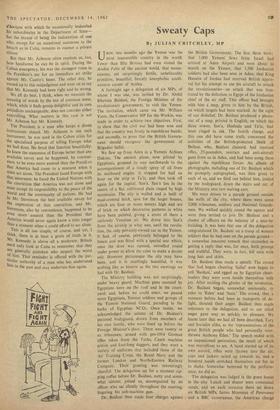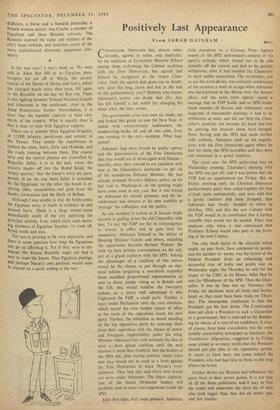Sweaty Caps
UNEIL two months ago the Yemen was the most inaccessible country in the world. Fewer than fifty Britons had even visited the Arabia Felix of the ancient world, that moun- tainous, yet surprisingly fertile, unbelievably primitive, beautiful, fiercely xenophobic south- western corner of Arabia.
A fortnight ago a delegation of six MPs, of whom I was one, was invited by Dr. Abdul Rhaman Baidani, the Foreign Minister of the revolutionary government, to visit the Yemen. The invitation, which came via Mr. William Yates, the Conservative MP for the Wrekin, was made in order to achieve two objectives. First, to show that the civil war had been won and that the country was firmly in republican hands; and secondly, to press that the British Govern- ment should recognise the government of Brigadier Sallal.
We flew up from Aden in a Yemeni Airlines Dakota, The ancient plane, now piloted by Egyptians, groaned its way northwards to the accompaniment of a steady spray of oil from its starboard engine. It stopped for half an hour on the strip at Ta'iz, and then took off again for the capital, San'a. San'a lies in the centre of a flat, cultivated plain ringed by high mountains. The city is walled and is built of mud-covered brick, save for the larger houses, which are four or more storeys high and are of brick on which decorative patterns in white have been painted, giving a street of them a curiously Venetian air. We drove into San'a from the airstrip in what was, until the revolu- tion, the only privately-owned car in the Yemen. It had, of course, previously belonged to the Imam and was fitted with a special seat which, once the door was opened, swivelled round under power to allow the ruler to make a decent exit. However picturesque the city may have been, and it is startlingly beautiful, it was nothing like as bizarre as the two meetings we had with Dr. Baidani.
The Ministry building was, not surprisingly, under heavy guard. Machine guns manned by Egyptians were on the roof and in the court- yard: and, before we could enter, we passed more Egyptians, Yemeni soldiers and groups of the Yemeni National Guard, parading to the barks of Egyptian NC0s, Once inside, we acknowledged the salutes of Dr. Baidani's personal bodyguard, drawn from members of his own family, who were lined up before the Foreign Minister's door. There were twenty or so tribesmen, armed with pre-1914 German rifles taken from the Turks, Czech machine pistols and foot-tong daggers, and they wore a variety of uniforms that included those of the Air Training Corps, the Royal Navy and the former London and North-Eastern Railway Company. Their greeting was reassuringly cheerful. The delegation sat for a moment sip- ping coffee before Dr. Baidani, natty and some- what sinister, joined us, accompanied by an officer who sat silently throughout the meeting, fingering his sub-machine gun.
Dr. Baidani then made four charges against By JULIAN CRITCHLEY, MP the British Government. The first three were: that 1.000 Yemeni Jews from Israel had arrived at Aden Airport and were about to march on the Yemen; that 1,500 Jordanian soldiers had also been seen in Aden; that King Hussein of Jordan had received British appro- val for his attempt to use his aircraft to attack the revolutionaries—an attack that was frus- trated by the defection to Egypt of the Jordanian chief of the air staff. This officer had brought with him a map, given to him by the British, on which targets had been marked. At the sight of our disbelief, Dr. Baidani produced a photo- stat of a map, printed in English, on which the three towns, San'a, Hodeida and Ta'iz, had been ringed in ink. The fourth charge, and this one did have some truth, concerned the activities of the British-protected Sheik of Beihan, who, Baidani claimed, had received rifles, 25-pounders, mortars and anti-aircraft guns from us in Aden, and had been using them against the republican forces. An album of photographs, including one of Dr. Baidani which he promptly autographed, was then given to each of us, and we filed out behind him, jostled by the bodyguard, down the stairs and out of the Ministry into two waiting cars.
We were driven to a parade ground outside the walls of the city, where there were some 3,000 tribesmen, soldiers and National Guards- men. We walked quickly round the square and were then invited to join Dr. Baidani and a cluster of officers on the balcony of a near-by building. It was here that one of the delegation congratulated Dr. Baidani on a troop of women soldiers that he had seen on the parade ground— a somewhat innocent remark that succeeded in getting a reply that was, for once, both prompt and truthful. They were, in fact, hill men with long hair and skirts.
Dr. Baidani then made a speech. The crowd that had begun chanting 'SAW' now began to yell `Baidani,' and egged on by Egyptian cheer- leaders they were soon beside themselves with joy. After reciting the glories of the revolution, Dr. Baidani began, somewhat ominously, to refer to 'Eden' and 'Suez.' The crowd, that a moment before had been in transports of de- light, shouted their anger. Baidani then made reference to the delegation, and to our relief anger gave way as quickly to pleasure. We learnt later that we had all been described, Tory and Socialist alike, as the 'representatives of the great British people who had personally over- thrown Anthony Eden.' The speech ended with an impassioned peroration, the result of which was marvellous to see. A band started up of its own accord, rifles were thrown into the air, caps and jackets sailed up towards us, and a hundred hands stretched themselves out for us to shake. Somewhat bemused by the perform- ance, we did so.
The delegation was lodged in the guest house in the city. Lunch and dinner were communal meals, and on each occasion there sat down six British MPs, James Mossman of Panorama and a BBC cameraman, the American chargé d'affaires, a Swiss and a Swedish journalist, a French woman doctor, two Czechs, a number of Egyptians and three Russian colonels. The Russians manned the radar and wireless of the City's three airfields, and doubtless much of the more sophisticated electronic equipment else- where.
Is the war over? I don't think so. We were told in Aden that 400 or so Egyptian para- troopers are cut off in Marib, the ancient capital of the Queen of Sheba, and Sad'a, which has changed hands more than once, fell again to the Royalists on the day we flew out. There is also fighting between Yemeni National Guards and tribesmen in the south-east, close to the Aden Protectorate border. Nevertheless, it is clear that the republic controls at least two- thirds of the country. What is equally clear is that it does so only with Egyptian support.
There are at present three Egyptian brigades, or 12,000 infantry, paratroops and armour in the Yemen. They enable the republicans to Control the cities, San'a, Ta'iz and Hodeida, and the roads running between them. The coastal strip and the central plateau are controlled by Brigadier Sallal; it is in the east, where the country shades off into the Rubal Khali, the empty quarter,' that the Imam's force are para- mount. If on the one hand Sallal is sustained by the Egyptians, on the other the Imam is re- ceiving rifles, ammunition and gold from the Saudis, Jordanians and the Sheik of Beihan.
Although I was unable to visit the battle areas. tilt Egyptian army is much in evidence in and around San'a. There is a large tented camp immediately south of the city adjoining the Principal airstrip, from which early each morn- in; numbers of Egyptian Ilyushin 14s took off, flying south and east.
The war is proving to be very expensive, and thre is some question how long the Egyptians can go on affording it. Yet if they were to dis- engate, the Yemen Republic might not find it easy to resist the Imam. Thus Egyptian prestige, and rie.-haps Nasser's own position, would seem to depend on a quick ending to the war.



































 Previous page
Previous page